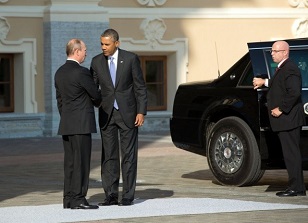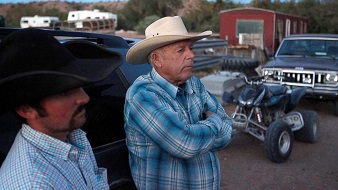Trying Not to Give Peace a Chance

President Vladimir Putin of Russia welcomes President
Barack Obama to the G20 Summit at Konstantinovsky
Palace in Saint Petersburg, Russia, Sept. 5, 2013.
Exclusive: The trust between President Obama and President Putin helped avert a U.S. war on Syria and got Iran to agree to limit its nuclear program, but the neocon-driven crisis in Ukraine has dashed hopes of building on that success for a more peaceful world.
The unnecessary and regrettable conflict between the U.S. and Russia over Ukraine brings to mind sad remembrances of important junctures at which I watched – as a citizen and a CIA analyst – chances for genuine peace with Russia frittered away.
How vividly I recall John Kennedy’s inaugural address when he bid us to ask not what our country could do for us, but rather what we could do for our country. Then and there I decided to put in the service of our government whatever expertise I could offer from my degrees in Russian. So I ended up in Washington more than a half-century ago.
The missed chances for peace did not wait. On April 17, 1961, a ragtag CIA-trained-and-funded paramilitary group of some 1,500 men went ashore on Cuba’s Bay of Pigs and were defeated in three days by Cuban forces led by Fidel Castro. CIA Director Allen Dulles and the senior military had intended to mousetrap young President Kennedy into committing U.S. military forces to a full-scale invasion, in order to bring what we now blithely call “regime change” to Cuba.
The planned mousetrap, shown for example in Dulles’s own handwriting on paper found in his study after his death, didn’t work. Kennedy had warned Dulles emphatically that he would not send U.S. armed forces into the fray. He stuck to that decision, and thereby created a rancid hatred on the part of Dulles, whom Kennedy fired, and from the Joint Chiefs of Staff, whom Kennedy should also have fired. The top generals, whom Deputy Secretary of State George Ball described as a “sewer of deceit,” had been in on the cabal.

























